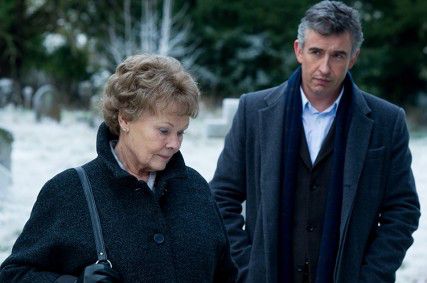
It sounds like it could be a cliché, but Philomena, directed by Stephen Frears, by no means fits into this mold. In fact, Philomena breaks the mold.
The British film is based on Martin Sixsmith’s book The Lost Child of Philomena Lee, a true story from which much of the film’s screenplay is drawn. Starring Judi Dench as title character Philomena and Steve Coogan as the journalist Sixsmith (who covers Philomena’s story), the movie tells the heartbreaking tale of Philomena, a teenager who had become pregnant and gone to live in the Roscrea convent. Here, she was forced by Catholic nuns to work in the laundry house. These nuns, meanwhile, sold the children of the convent’s wards for adoption in the United States, a fate that Philomena herself encounters when her own child Anthony is taken away from her.
Coogan’s character Sixsmith, a former political advisor who gets ousted from his job, stumbles upon this “human interest” story and takes it solely out of desperation, his reputation already tarnished. Hesitant to get involved, he meets with Philomena, at this point an elderly Irish woman, and together they begin to confront the task at hand — finding her lost child. They travel first to the convent, where they are told that all records have been lost in a fire. The faithful and devout Philomena naively accepts this as fact, accustomed to getting nowhere in her search for her son. The curious and cynical reporter in Sixsmith, however, has no such Catholic faith and thus refuses to believe the nuns. Consequently, they travel from this Irish facility to America, searching for more information, and determined to discover the real truth. More specifically, as Philomena would put it, she desperately longs to find out “if Anthony ever thought of [her].”
Dench and Coogan make a lively pair, often producing witty and comical moments. Dench is fantastic as usual — she expertly brings out the youthful spirit hidden beneath her elderly character, who is comically enrapt by romance novels and gets adorably overexcited about hotel chocolates, bathrobes and buffet breakfasts. Coogan, who co-wrote the script and also produced the film, is equally as great, especially because his character is so realistic. He is sarcastic and doubtful, the perfect counter to Dench’s congenial and literal personality. Though these two companions initially clash, they together make the journey incredibly entertaining for both each other and audiences in the theater (which, at the screening of this film, was filled with a largely post-midlife-crisis audience).

The film has touching moments as well, and it makes subtle critiques of faith itself. Coogan is the one who doubts and who aims to reveal just how unfaithful the practices of the “evil nuns” were back in the ‘50s. At times rude and blunt, Coogan’s Sixsmith does not understand Philomena’s loyalty to these nuns or to the Catholic Church. It is this same faith, however, that the film investigates and ultimately upholds, despite Sixsmith’s struggle to fully accept it. And in these moments, the film is truly complex and beautiful.
This beauty is reinforced by delicate filmmaking. There are numerous — and well-executed — flashbacks to Philomena’s teenage years, which provide her back-story in emotional snippets that add to the multiple facets of Dench’s character. Young Philomena is played by Sophie Kennedy Clark, who also does an excellent job in creating a poignant foundation for Philomena’s later years. These flashbacks are seamlessly incorporated and supported by a moving soundtrack courtesy of Alexandre Desplat, well-known as the composer for Argo, Harry Potter and the Deathly Hallows: Part 1 (and Part 2), and The King’s Speech.
Philomena — part-thriller, part-mystery, part-adventure, part-comedy, part-drama — is a story like many others in basic plot. It’s been seen before: a search for long-lost family, a struggle between one who has faith and one who does not. Nonetheless, unlike so many others that depict the yearning for companionship or the age-old conflict between the optimist and the cynic, Philomena is a film completely original in its construction and conveyance, and on top of all that, it is expertly carried out. Complete with brilliant lead acting, poignant moments of loss and desperation and a touching storyline that avoids what is expected, Philomena conveys the real truth, and nothing but it.
This is an account occasionally used by the Daily Free Press editors to post archived posts from previous iterations of the site or otherwise for special circumstance publications. See authorship info on the byline at the top of the page.



